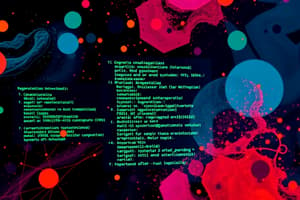Podcast
Questions and Answers
What is the primary function of operating system services?
What is the primary function of operating system services?
- To ensure programs do not interact with each other
- To limit user access to system resources
- To provide an environment for program execution and user services (correct)
- To manage hardware resources only
Which of the following is considered a function helpful to the user provided by operating systems?
Which of the following is considered a function helpful to the user provided by operating systems?
- Memory management techniques
- Network protocol management
- User interface support (correct)
- CPU scheduling algorithms
When are classes considered to begin based on the attendance policy?
When are classes considered to begin based on the attendance policy?
- Always on time with no exceptions
- 10 minutes after the scheduled time
- 15 minutes after the scheduled time (correct)
- 5 minutes after the scheduled time
What should students do to prepare for the course sessions?
What should students do to prepare for the course sessions?
Which aspect is NOT focused on in the course outline?
Which aspect is NOT focused on in the course outline?
What must students adhere to regarding deadlines in the course?
What must students adhere to regarding deadlines in the course?
What is a key reason why applications are specific to an operating system?
What is a key reason why applications are specific to an operating system?
Which of the following represents a service that operating systems might provide to programs?
Which of the following represents a service that operating systems might provide to programs?
What is one of the primary functions related to I/O operations in an operating system?
What is one of the primary functions related to I/O operations in an operating system?
Which statement accurately describes resource allocation in operating systems?
Which statement accurately describes resource allocation in operating systems?
How do processes communicate in an operating system?
How do processes communicate in an operating system?
What role does error detection play in operating systems?
What role does error detection play in operating systems?
Which feature is essential for the manipulation of file systems in operating systems?
Which feature is essential for the manipulation of file systems in operating systems?
Which operating system service assists with efficiently using the system's capabilities?
Which operating system service assists with efficiently using the system's capabilities?
What is the main purpose of batch program execution in an operating system?
What is the main purpose of batch program execution in an operating system?
Which of the following describes a characteristic of a GUI compared to CLI?
Which of the following describes a characteristic of a GUI compared to CLI?
Which of the following best describes the role of system services in an operating system?
Which of the following best describes the role of system services in an operating system?
What is the primary purpose of logging in a multiuser or networked computer system?
What is the primary purpose of logging in a multiuser or networked computer system?
What is a primary function of file management in operating systems?
What is a primary function of file management in operating systems?
Which of the following is NOT a type of system call?
Which of the following is NOT a type of system call?
Which service is responsible for enabling communication between processes and users?
Which service is responsible for enabling communication between processes and users?
What component of the operating system is responsible for linking object files into a single executable?
What component of the operating system is responsible for linking object files into a single executable?
How are parameters usually passed to the operating system in system calls?
How are parameters usually passed to the operating system in system calls?
What is the main function of a Command Line Interpreter (CLI)?
What is the main function of a Command Line Interpreter (CLI)?
Which of the following statements about background services in an operating system is true?
Which of the following statements about background services in an operating system is true?
What type of object file can be loaded into any physical memory location?
What type of object file can be loaded into any physical memory location?
Which of the following accurately describes a GUI (Graphical User Interface)?
Which of the following accurately describes a GUI (Graphical User Interface)?
What is the relationship between system calls and APIs (Application Programming Interfaces)?
What is the relationship between system calls and APIs (Application Programming Interfaces)?
Which of the following is NOT typically considered part of the operating system?
Which of the following is NOT typically considered part of the operating system?
What is the purpose of a loader in an operating system?
What is the purpose of a loader in an operating system?
Which of the following is considered a protection mechanism in an operating system?
Which of the following is considered a protection mechanism in an operating system?
How do modern operating systems manage libraries during execution?
How do modern operating systems manage libraries during execution?
Which method is NOT used for passing parameters to the operating system?
Which method is NOT used for passing parameters to the operating system?
What does the system call interface maintain?
What does the system call interface maintain?
What type of information can status information programs typically provide?
What type of information can status information programs typically provide?
What is one common example of a system program?
What is one common example of a system program?
Which of the following statements about system call implementations is correct?
Which of the following statements about system call implementations is correct?
What typically occurs when a process exits with the code greater than 0?
What typically occurs when a process exits with the code greater than 0?
Which type of system call would likely be used to allocate memory?
Which type of system call would likely be used to allocate memory?
Which of the following best describes the role of external I/O device protection in operating systems?
Which of the following best describes the role of external I/O device protection in operating systems?
Flashcards
User Interface
User Interface
An interface between a user and the operating system, providing ways to interact with the computer.
Operating System Services
Operating System Services
A set of functions provided by the operating system to facilitate program execution and user interaction.
System Calls
System Calls
Specific requests from a program to the operating system to perform certain tasks.
Linking
Linking
Signup and view all the flashcards
Loading
Loading
Signup and view all the flashcards
Device Drivers
Device Drivers
Signup and view all the flashcards
Kernel Modules
Kernel Modules
Signup and view all the flashcards
Compilation
Compilation
Signup and view all the flashcards
Graphical User Interface (GUI)
Graphical User Interface (GUI)
Signup and view all the flashcards
Command-Line Interface (CLI)
Command-Line Interface (CLI)
Signup and view all the flashcards
Program Execution
Program Execution
Signup and view all the flashcards
I/O Operations
I/O Operations
Signup and view all the flashcards
File System
File System
Signup and view all the flashcards
Resource Allocation
Resource Allocation
Signup and view all the flashcards
Communication (in Operating Systems)
Communication (in Operating Systems)
Signup and view all the flashcards
Error Detection
Error Detection
Signup and view all the flashcards
System Programs
System Programs
Signup and view all the flashcards
File Management
File Management
Signup and view all the flashcards
Status Information Programs
Status Information Programs
Signup and view all the flashcards
Text Editors
Text Editors
Signup and view all the flashcards
Programming Language Support
Programming Language Support
Signup and view all the flashcards
Dynamically Linked Libraries (DLLs)
Dynamically Linked Libraries (DLLs)
Signup and view all the flashcards
System Call Interface
System Call Interface
Signup and view all the flashcards
Application Program Interface (API)
Application Program Interface (API)
Signup and view all the flashcards
Process Control System Calls
Process Control System Calls
Signup and view all the flashcards
File Management System Calls
File Management System Calls
Signup and view all the flashcards
Device Management System Calls
Device Management System Calls
Signup and view all the flashcards
Information Maintenance System Calls
Information Maintenance System Calls
Signup and view all the flashcards
Communication System Calls
Communication System Calls
Signup and view all the flashcards
Protection System Calls
Protection System Calls
Signup and view all the flashcards
Bourne Shell
Bourne Shell
Signup and view all the flashcards
Study Notes
Operating System Services
- Operating systems provide an environment for programs and users
- Helpful services are:
- User Interface (UI): Command-line (CLI), Graphical User Interface (GUI), touch-screen, batch
- Program execution: loading programs into memory, running, ending execution (normal or abnormal)
- I/O operations: reading and writing to files or devices
- File-system manipulation: creating, deleting, reading, writing, listing files and directories
- Other user-helpful Operating System services:
- Communications: processes exchange information (same computer, network) via shared memory or message passing
- Error detection: OS constantly monitors for errors (CPU, memory, I/O devices, user programs)
- Debugging facilities: improve user and programmer ability to use the system efficiently
System Services
- Resource Allocation: allocating resources (CPU cycles, memory, storage, I/O devices) to multiple users or jobs running concurrently.
- Logging: keeping track of user resource usage.
- Protection and security: controlling access to information and resources, authenticating users, and protecting external I/O devices from invalid access attempts.
System Calls
- Programming interface to OS services
- Typically written in high-level languages (C or C++)
- Mostly accessed by programs via Application Programming Interface (API) instead of direct system calls
- Common APIs:
- Win32 API (Windows)
- POSIX API (UNIX, Linux, Mac OS X)
- Java API (Java Virtual Machine - JVM)
System Call Implementation
- Typically each system call has a unique number for indexing by the system call interface
- System call interface makes a table of the numbers to the intended system calls in the OS kernel.
- The caller needs to know the API and what OS does for the result
- Managed by run-time support library (set of functions built into libraries included with the compiler)
System Call Parameter Passing
- Often more information is required than just identifying the desired system call
- There are 3 general methods to pass parameters to the OS:
- Simplest approach: parameters passed in registers
- If too may parameters, they are passed in a block, or table in memory
- Parameters are placed onto the stack by the program and popped by the OS
Types of System Calls
- Process control: create, terminate, load, execute, get/set attributes, wait for time, wait for event, signal event, allocate/free memory, debugging tools, locks
- File management: create, delete, open, close, read, write, reposition, get/set attributes
- Device management: request, release device, read, write, reposition, get/set attributes, attach/detach devices.
- Information maintenance: get/set time, date, system data, process, file, or device attributes.
- Communications: creating connections, sending/receiving messages, naming processes. shared-memory model.
- Protection: control access to resource, get/set permissions, allow/deny user access.
Linkers and Loaders
- Source code is compiled into object files to be loaded into any physical memory location.
- Linker combines object files into a single binary executable.
- Loader brings the binary executable into memory to execute.
- Relocator: adjusts addresses in the code and data within the program to match the final memory location.
- Modern systems use dynamically linked libraries (like DLLs in Windows) to avoid linking libraries into the executable; libraries are loaded as needed.
System Programs
- Provide a convenient environment for program development and execution
- File manipulation
- Programming language support
- Program loading and execution
- Communications
- Background services
- Application programs
Studying That Suits You
Use AI to generate personalized quizzes and flashcards to suit your learning preferences.




